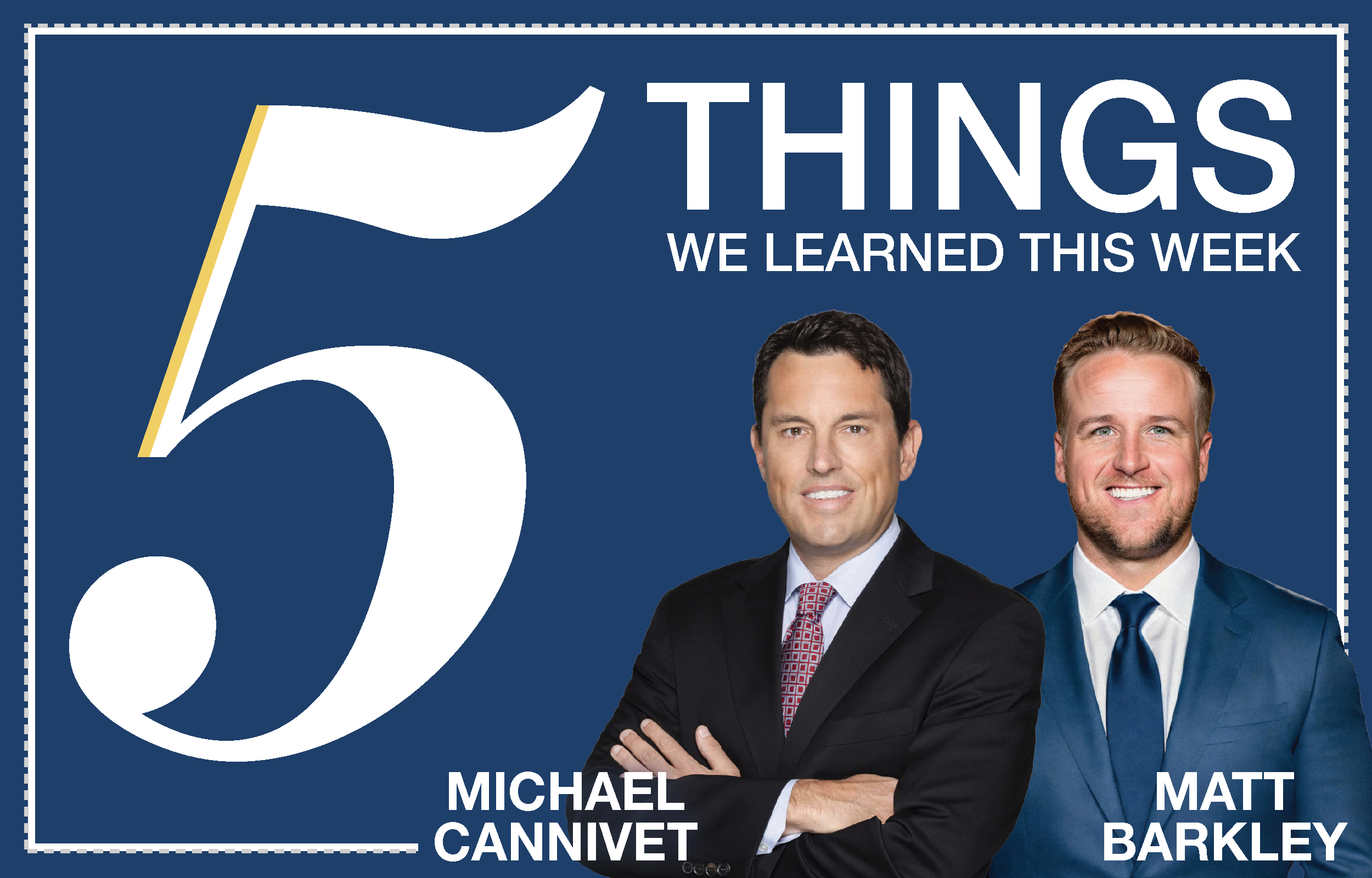5 Things We Learned This Week - 8/31/2025
Submitted by Silverlight Asset Management, LLC on August 31st, 2025
August 31, 2025
The S&P 500 declined 0.1% this week. The Bloomberg Aggregate Bond Index gained 0.1%, while Gold rose 2.4% and Bitcoin fell 7.3%.
The inflation data worsened this week as the Fed's preferred inflation metric (PCE) moved further above their 2% target, rising to 2.6%. Core PCE, which excludes food and energy, rose 2.9%. Consumer confidence dipped to 97.4, and the Future Expectations index declined to 74.8, which is below the Conference Board's recession warning signal.
Regular readers may notice the economic news hasn't been great for a while. Even though many standard economic readings have suggested recession-like conditions in the U.S. for most of this year, markets remain near an all-time high. This is mainly due to rising liquidity.
The Treasury Department has stimulated liquidity by shortening the duration of its debt issuance, notably increasing the supply of short-term Treasury bills and the frequency of buybacks in longer maturities. This has increased the Treasury cash balance (a proxy for government liquidity) to approximately $500 billion at the end of July, leading to a significant rise in market liquidity. As we discuss in this week's second story, economic stimulus is ongoing. This is probably de-linking asset prices from their traditional correlation to the cyclical parts of the economy that used to heavily influence the trajectory of the S&P 500.

What Are the Investing Implications If Trump's Tariffs Are Deemed Illegal?

A federal appeals court ruled this week that Trump’s signature tariffs are illegal. However, enforcement is paused until at least mid-October, likely setting the stage for a Supreme Court showdown later this year. A decision could come as early as late fall or early winter, given the urgency and political profile of the case.
Regardless of the outcome, a looming demand air pocket is probable. Businesses and consumers front-loaded purchases ahead of the tariff hikes, which will dampen the future rate of change in consumption and capital expenditures.
Meanwhile, ongoing liquidity injections from the Treasury, paired with tariff-induced inflation, risk creating a stagflation environment where stubborn inflation occurs alongside slowing growth. We expect this to take shape over the next 6 to 9 months. Investors should prepare by owning commodities, inflation-protected bonds (like TIPS), and precious metals (such as gold and silver). These categories have historically outperformed when stagflation takes hold. Conversely, growth stocks, REITs, and long-duration bonds typically underperform in such environments due to rising input costs and downward pressure on economic activity. Strategic asset allocation will be critical as these legal and macroeconomic crosswinds play out over the remainder of 2025.

The Psychology of Permanent Stimulus

Not long ago, we had a conversation with a retired CFO over lunch in Newport Beach. Between bites of Coconut shrimp, he leaned back and said: “Guys, it feels like the economy has become allergic to pain. One bad quarter, and Washington panics.”
That remark struck us—and it captures the essence of Vincent Deluard’s recent report on The Psychology of Permanent Stimulus. His thesis? The system has quietly re-wired itself so that downturns are no longer viewed as part of a natural cycle, but as existential threats that must be “treated” immediately.
Deluard points to three forces reshaping this landscape:
Demographics as a hidden UBI (Universal Basic Income). As populations age, pensions and healthcare bills balloon. Retirees keep spending, while the pool of workers shrinks. The result? Every slowdown now threatens not just markets, but the social contract itself. Recessions become intolerable as pensions and healthcare become ever larger claims on current workers.
Politics and inequality. In a world of fraying trust and widening wealth gaps, elected leaders view recession avoidance as their prime directive. If a politician already has a low approval rating (like everybody in Congress), a recession is almost a guaranteed pink slip in the next election. Debt-financed spending and backstops for asset prices have become political survival strategies to stave off social unrest.
Technology and the AI specter. If automation already raises fears of displacement, imagine layering on a recession. That turns a cyclical slowdown into a crisis of confidence, inviting policymakers to lean in with fiscal and monetary firepower before the damage takes root.
As Deluard puts it, permanent stimulus is a form of addiction: a choice to numb discomfort rather than confront it. The implications are profound—higher baseline spending, structural output gaps, and a bias to inflate away shocks rather than endure them.
For long-term allocators, the question isn’t whether this regime will persist. It’s how to position portfolios in a world where the “treatment” is perpetual, and the patient is hooked.

Artificial Intelligence Can’t Replace Free Markets

Could an all-knowing algorithm outmaneuver the wisdom of a market crowd? A recent essay argues no—and makes a compelling case.
AI excels at pattern-matching from yesterday’s data, but economies are forward-looking. The future is shaped by entrepreneurs who place real bets under uncertainty. Prices aren’t static inputs a supercomputer can “optimize”; they’re dynamic signals created by property, profit, and loss. Strip away those incentives and you don’t get smarter planning; you get brittle models with no skin in the game.
The authors lean on Hayek and Mises to remind us that prosperity flows from discovery, not by decree. Markets don’t just allocate known resources. Markets reveal new scarcities and opportunities through competition, experimentation, and feedback. AI can certainly help firms operate better, but it cannot predict the next black swan event, or know what it feels like to bear entrepreneurial risk—core functions of free exchange.
About ten years ago, we experimented with an AI-driven sector rotation strategy. Hired a professor from Georgia Tech to design it right. Everything seemed very promising at the start. He produced a sterling backtest. But when we attempted to translate that into real-time performance, the results were dismal. Thank goodness the strategy was only paper traded!
Fast-forward to today. Yes, the AI models have certainly improved. But they still have the same Achilles heel problem; they are completely backward looking. If you drive a car only looking in the rearview mirror, you are guaranteed to eventually crash. Therefore, we view AI as an important research tool, but not a complete package we can blindly trust to allocate capital.

Silver Wheaton Investment Thesis
Silverlight clients recently acquired a stake in Wheaton Precious Metals, a company we view as a unique gateway to one of the world’s most timeless assets: silver.
In today’s uncertain climate—where inflation lingers, governments grapple with debt, and geopolitical tensions simmer—hard assets like silver shine even brighter. Silver is rare in its dual role: it has been trusted for centuries as a store of value, while also powering the future through its vital use in electrification, solar energy, and advanced technologies. This combination of tradition and innovation makes silver an ideal asset for the next decade.
Wheaton stands apart in how it unlocks this opportunity. Rather than taking on the risks of digging mines, the company provides capital to miners in exchange for the right to buy a portion of future silver and gold production at fixed, low costs. This streaming and royalty model gives Wheaton an “asset-light” profile—capturing upside from rising demand and prices while sidestepping many of the operational risks that weigh on traditional, capital-intensive miners.
Our thesis: Wheaton’s globally diversified portfolio, disciplined model, and long-term partnerships give it durable competitive advantages that should compound value for decades to come.

Shark Tank Billionaire Tells Gen Z To Fade TikTok and Study Greek Philosophy
“Nothing in life is as important as you think it is while you are thinking about it.” — Daniel Kahneman
Kahneman’s insight reminds us that our instinctive, fast-twitch reactions often exaggerate urgency. When it comes to solving meaningful problems—whether in investing, leadership, or life—it’s usually the slower, more deliberate mode of thinking that cuts through noise and produces clarity.
Fortune’s latest profile of KIND Snacks founder and Shark Tank investor Daniel Lubetzky offers a clear message for our careers: if you want an edge in an AI-saturated job market, stop doomscrolling in places like TikTok and study the ancient Greek philosophers.
Lubetzky suggests that constant feed-driven distraction erodes the very muscles—attention, judgment, and ethics—that separate durable corporate contributors from replaceable underperformers. His prescription: Plato, Socrates, and Aristotle as training for first-principles thinking and building resilience under pressure.
There are many people predicting that AI will rival human abilities within five years. If machines soon match our pattern recognition, Lubetzky’s point is that your advantage shifts to what algorithms don’t own: disciplined reasoning, moral clarity, and the capacity to synthesize across domains.
In other words, critical thinking is going to be a paramount skill.
So, in a world where AI is bound to grow more pervasive, how about treating the classics as an underrated form of career insurance?
This material is not intended to be relied upon as a forecast, research or investment advice. The opinions expressed are as of the date indicated and may change as subsequent conditions vary. The information and opinions contained in this post are derived from proprietary and non-proprietary sources deemed by Silverlight Asset Management LLC to be reliable, are not necessarily all-inclusive and are not guaranteed as to accuracy. As such, no warranty of accuracy or reliability is given and no responsibility arising in any other way for errors and omissions (including responsibility to any person by reason of negligence) is accepted by Silverlight Asset Management LLC, its officers, employees or agents. This post may contain “forward-looking” information that is not purely historical in nature. Such information may include, among other things, projections and forecasts. There is no guarantee that any of these views will come to pass. Reliance upon information in this post is at the sole discretion of the reader.
Testimonials Content Block
More Than an Investment Manager—A Trusted Guide to Financial Growth
"I’ve had the great pleasure of having Michael as my investment manager for the past several years. In fact, he is way more than that. He is a trusted guide who coaches his clients to look first at life’s bigger picture and then align their financial decisions to support where they want to go. Michael and his firm take a unique and personal coaching approach that has really resonated for me and helped me to reflect upon my core values and aspirations throughout my investment journey.
Michael’s focus on guiding the "why" behind my financial decisions has been invaluable to me in helping to create a meaningful strategy that has supported both my short-term goals and my long-term dreams. He listens deeply, responds thoughtfully, and engages in a way that has made my investment decisions intentional and personally empowering. With Michael, it’s not just about numbers—it’s about crafting a story of financial growth that has truly supports the life I want to live."
-Karen W.
Beyond financial guidance!
"As a long-term client of Silverlight, I’ve experienced not only market-beating returns but also invaluable coaching and support. Their guidance goes beyond finances—helping me grow, make smarter decisions, and build a life I truly love. Silverlight isn’t just about wealth management; they’re invested in helping me secure my success & future legacy!"
-Chris B.
All You Need Know to Win
“You likely can’t run a four-minute mile but Michael’s new book parses all you need know to win the workaday retirement race. Readable, authoritative, and thorough, you’ll want to spend a lot more than four minutes with it.”
-Ken Fisher
Founder, Executive Chairman and Co-CIO, Fisher Investments
New York Times Bestselling Author and Global Columnist.
Packed with Investment Wisdom
“The sooner you embark on The Four-Minute Retirement Plan, the sooner you’ll start heading in the right direction. This fun, practical, and thoughtful book is packed with investment wisdom; investors of all ages should read it now.”
-Joel Greenblatt
Managing Principal, Gotham Asset Management;
New York Times bestselling author, The Little Book That Beats the Market
Great Full Cycle Investing
“In order to preserve and protect your pile of hard-earned capital, you need to be coached by pros like Michael. He has both the experience and performance in The Game to prove it. This is a great Full Cycle Investing #process book!”
-Keith McCullough
Chief Executive Officer, Hedgeye Risk Management
Author, Diary of a Hedge Fund Manager
Clear Guidance...Essential Reading
“The Four-Minute Retirement Plan masterfully distills the wisdom and experience Michael acquired through years of highly successful wealth management into a concise and actionable plan that can be implemented by everyone. With its clear guidance, hands-on approach, and empowering message, this book is essential reading for anyone who wants to take control of their finances and secure a prosperous future.”
-Vincent Deluard
Director of Global Macro Strategy, StoneX



